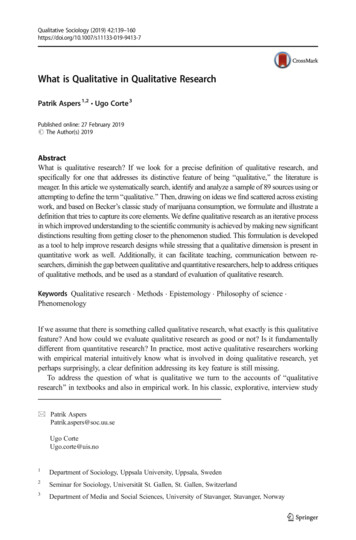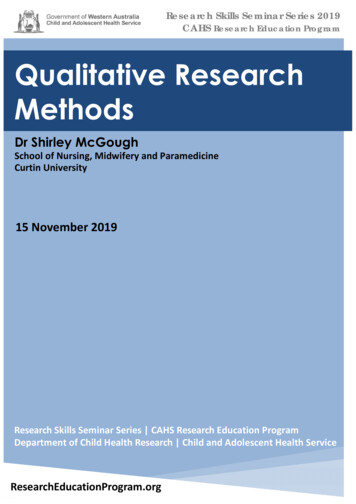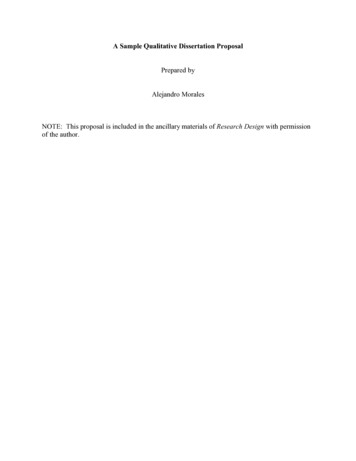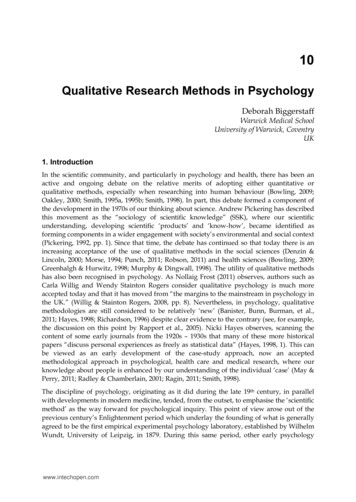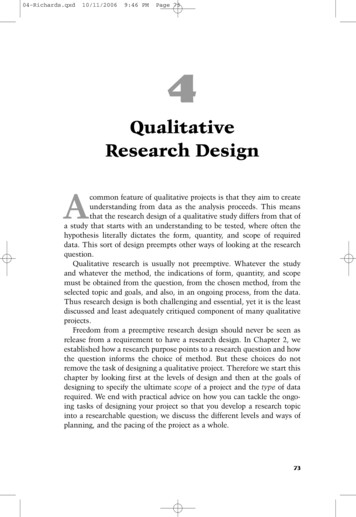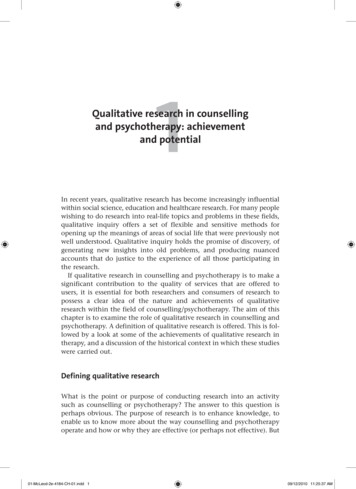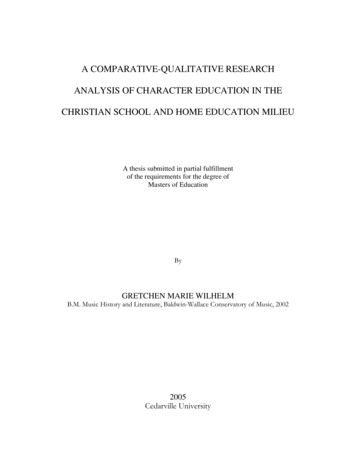
Transcription
A COMPARATIVE-QUALITATIVE RESEARCHANALYSIS OF CHARACTER EDUCATION IN THECHRISTIAN SCHOOL AND HOME EDUCATION MILIEUA thesis submitted in partial fulfillmentof the requirements for the degree ofMasters of EducationByGRETCHEN MARIE WILHELMB.M. Music History and Literature, Baldwin-Wallace Conservatory of Music, 20022005Cedarville University
CEDARVILLE UNIVERSITYSCHOOL OF GRADUATE STUDIESMay 7, 2005I HEREBY RECOMMEND THAT THE THESIS PREPARED UNDERMY SUPERVISION BY Gretchen Marie Wilhelm ENTITLEDA Comparative-Qualitative Research Analysis of Character Education in the ChristianSchool and Home Education Milieu BE ACCEPTED IN PARTIAL FULFILLMENT OFTHE REQUIREMENTS FOR THE DEGREE OF Master of Education.William E. Brown, Ph.D.Cedarville University PresidentRobert W. Milliman, Ph.D.Academic Vice PresidentKevin Sims, Ph.D.Dean, School of Social Sciencesand Professional StudiesStephen S. Gruber, Ed. D.Coordinator, Masters ofEducation Degree ProgramMichael W. Firmin, Ph.D.Psychology Department ChairmanThesis Advisor2
ABSTRACTWilhelm, Gretchen Marie. M. Ed. Education Dept., Cedarville University, 2005.A Comparative-Qualitative Research Analysis of Character Education in the ChristianSchool and Home Education Milieu.This qualitative study provides a phenomenological perspective and comparative analysisof character education within the Christian school and home education milieu. The study is basedon semi-structured interviews of fifty-two individuals (N 52) representative of a sampling ofChristian educators from four private, evangelical Christian Schools (n 26) and area homeeducating families (n 26). The intent of the researcher was to bring attention to the importancefor Christian educators to come to terms with the worldview from which the desire to educateChristian youth in a separate moral community originates. Although the purpose and intent ofboth sets of educators were in many instances similar, significant deviations in methodology andapplication were found. The results of this study are defined in four similarities and sixdifferences, suggesting that character education and the juxtaposition of that goal along with thetransference of faith was a major contributor to the obvious commitment and calling felt byChristian educators.iii3
TABLE OF CONTENTSPageCHAPTER I: Introduction. .1Educational Significance .1Purpose of the Study . 3Review of Literature . 4Research Methodology . 9Biblical Integration. .11Application . .14Summary . 14CHAPTER II: Review of Literature . . . .16Importance of the Issue. 16Defining the Terms. .19Philosophy of Character Education 22Significant Factors .29Evaluation of Character Education Models . .31Historical Perspectives. .34Christian School Movement Today . .39Home Education Movement Today . .40Contemporary Research . .42Summary .46iv4
CHAPTER III: Research Method . . . .48Project Development. . .48Sample Criterion. .49Research Tools . . .52Participants . .57Descriptive Statistics .60Interview Process . 64Cataloging Interviewee Responses. . 65Qualitative Coding of the Data. .66Limitations .68CHAPTER IV: Qualitative Findings. . . .70Profound Commitment 70Importance of Character Education .73Character Education Defined by Milieu .75Foundational Philosophy 77Significance of Educational Structure in Character Development. 82Character Traits Emphasized .89Models Implemented in Christian School. . .91Models Implemented in Home Education . . . 95Evaluation of Character Education .99Perspective Outcomes of Character Education .102Summary .104v5
CHAPTER V: Conclusions. . .105Summary and Discussion. .105Suggestions for Implementation . 107Recommendations for Future Research. 109APPENDICES . . .112APPENDIX A: Sample Selection Criterion Checklist. .112APPENDIX B: Subject Interview Release Form . .113APPENDIX C: Subject Profile Form and Field Notes. .114APPENDIX D: Christian School Semi-Structured Interview Tool . .116APPENDIX E: Home Education Semi-Structured Interview Tool .118APPENDIX F: Project Explanation/ Formal Request for Participation.120APPENDIX I: Sample of Parent Survey .121BIBLIOGRAPHY . . . . .123VITA . . .138vi6
LIST OF TABLESTable 1: Profile Correlation Table of Christian Schools Comprising Interviewee Placesof Employment (n 4). . .51Table 2: Sample Profile of Years of Teaching Experience of Christian EducatorInterviewees (n 26). .58Table 3: Sample Profile of Years of Teaching Experience of Home EducatingInterviewees (n 26). . .59Table 4: Comparative Sample Profile of Interviewee’s Level of EducationalAttainment (N 52). . .61Table 5: Scatter Plot of Number of Children in the Home Educating Households ofResearch Subjects (n 26). . .63vii7
ACKNOWLEDGEMENTSThis work is dedicated to my Lord and Savior Jesus Christ, the God and Father ofAbraham, Isaac, and Jacob who has had His hand upon me from my mother’s womb andwho has so lovingly directed my steps to this point. This is my prayer, that I would befilled with the knowledge of His will in all wisdom and spiritual understanding; so that Imay have a walk worthy of the Lord, fully pleasing Him in every way, being fruitful inevery good work and increasing in the knowledge of God; strengthened with all mightaccording to His glorious power, giving thanks to the Father who has qualified me to be apartaker of the inheritance of the saints in the kingdom of light. For He has rescued mefrom darkness and brought me near into the kingdom of the Son He loves, in whom Ihave redemption, the forgiveness of sin.Colossians 1:9-14To Dr. Stephen Gruber, thank you for guiding me through the Cedarville GraduateProgram. I am grateful for your encouragement to attend the Focus on the FamilyInstitute during the course of my graduate work. Your wise counsel and cheerfulassistance were invaluable to me.To my students and fellow teachers at Greater Cleveland Christian High School, thankyou for the many experiences you provided to me in my first year of teaching. As MusicDirector, I enjoyed all of you electric guitar players! As the 7th & 9th grade healthteacher, I was tremendously blessed to challenge you to remain pure and keep yourselfemotionally and physically as a keepsake for your future spouse.To the amazing staff and mentors at Focus on the Family Institute. My life was impactedby your ministry and training. The Lord, in His perfect timing, led me to spend thosemonths in Colorado to grow me up in my faith while He faithfully provided for my everyneed. Thank you for all the time and effort you put forth to invest in the future leaders ofthis nation. Thanks to all the remarkable people I rubbed shoulders with while attending,you are all so special. Carpe Diem!To all ‘my kids,’ the 6th grade students at Christian Community School, I have enjoyedyour fun and creative potential. You are so special to me. Go for God and live for Himalways! To the wonderful CCS staff – Many thanks for encouraging me, through yourexample, to see teaching as a precious ministry opportunity. I am so grateful that Godhas placed me to serve in your midst.Finally, to my future husband, this degree is only one of the things that the Lord hascalled me to complete as I wait in eager anticipation of the day when I will pledge my lifeto you before God. I pray that God is preparing you to be the man of God that He desiresyou to be and will give you great courage and strength to make an impact for Hiskingdom.viii8
DEDICATIONI want to dedicate this thesis to my great-grandmother, Marie Teresa Smith,my grandmother, Marilyn Marie Mulligan, and to my mother, Sue Marie Wilhelm, all ofwhom have passed down to me, through the generations, an incredible legacy of teaching.Having been given the middle name of Marie, I am proud to continue this heritage.Thank you for your inspiration and encouragement to enter into the challenging field ofeducation. Grandma Mulligan - your faithful service to the Lord through your numerousteaching capacities over the years has been such a monument to God’s grace working inand through you. Mom - you are a spectacular home educator, a treasured example of agodly woman, a loving and sincere mentor, a trustworthy confidant, and truly my bestfriend. Your enthusiastic love for learning and your desire to continually pour into yourchildren has made all the difference in my life. Thank you for my thirteen years of homeeducation and for allowing us all to share so many rich learning experiences together as afamily. Thank you most of all mom and dad for filling me with a burning passionfor the Lord and His will for my life.ix9
CHAPTER I: IntroductionAmerican society and its public educational institutions continue to display adenunciation of Christian influence, the advancement of humanistic ideology, a crisis ofcharacter, and moral laxity. This endemic awareness has fueled a revival of charactereducation and has also served as a catalyst in the outgrowth of Christian schools andmore recently the home education movement. The support for these educational options,which provide opportunity for spiritual formation and character development as afoundation for knowledge, stands as a testimony to the desire of parents and educators toinfluence student integrity. The recognition that moral development and spiritualformation is a necessary component in the acquisition of knowledge appears to be amajor contributor to those who choose options other than the public schools for theacademic development of their youth.Educational SignificanceThe face of American education in the 21st century has experienced rapidtransformation brought about by many contributing factors. Most disturbing among theseare the humanistic secularization of public education and the internal purging of theJudeo-Christian foundation of morality and societal ethics. It is therefore significant tonote the unique sociological phenomenon existing in response to this rejection of thereligious underpinnings of American public education. The continual growth of privateschools and the increasing rate of home education (Ray, 1999; US Department ofEducation, 2001) indicate a movement away from public education, especially within theevangelical Christian community.1
Some concerned parents have bailed out of public schools, choosing rather tofund a private education for their children. Others accept the full responsibility of thateducation and seek to provide a learning lifestyle for their children in the form of homeeducation. One prominent author noted, “homeschooling’s most important lesson is thatparental involvement is essential to a child’s academic success” (Dobson, 2003, p. 204).Current trends reveal that a number of Christian parents feel they can no longer entrustthe public school system with their child’s potential, let alone their safety and academicadvancement (National Home Education Research Institute, 2000).The alternative to public education must be a clear and distinctive differentiationfrom a secular education. Christian virtue and moral development are, at times, assumedrather than purposefully implemented in Christian schools. In the home education milieu,the opportunity for parents to develop their child’s character abound, if they recognize itas the foundational motive for that form of education. Consequently, both venues shouldremember that, “while criteria for effective character education program development andimplementation can be found in the literature, many character education programs fail to begrounded in a well-researched conceptual framework” (Leming, 2000).Character development is imperative as a central tenant of a Christian student’seducational attainment. Therefore, it is important for Christian educators to come toterms with the worldview from which the desire to educate Christian youth in a separatemoral community originates. Coons (1992) stated: “Raising our children to represent ourown values is the most important form of speech most of us will ever experience Formost parents, it is obvious that their chance to influence the world abides largely in the2
message they are able to embody in their descendants” (Coons, 1992, p. 16). For thisreason it is necessary to examine the models utilized in character development within theChristian school and home education milieu in order to better serve the purpose for whichChristian education was first conceptualized. Thus, analysis of this issue is vital as itgoes beyond the individual success to impact future families, communities, governments,and consequently society at large.Purpose of the StudyThe primary purpose of this comparative-qualitative research analysis is to revealcommon patterns or themes regarding character education and to heuristically furtherresearch in this area. As such, this study will add to the body of knowledge available toeducation professionals as a median to the cultural climate of Christian education in boththe traditional form and home education. Organizations such as Association of ChristianSchools International (ASCI), American Association of Christian Schools (AACS), andothers will benefit from the information gathered in this study. The intent of theresearcher is to provide information, in the form of qualitative data, regarding currentpractices and the epistemological understanding of character education in the Christianschool and home education arena. Thus, the study’s first goal is to generate hypothesescreated from grounded theory that will promote further research in this area.A second function of this study is to shed light on the current expansion of homeeducation in evangelical Christian circles and its relationship to formal Christianeducation. For Christian educators, the importance of this study has far reachingramifications. It probes potential motivations and the rationales of home education,3
offering insight concerning common misconceptions as to the roles and motives ofparents who home educate. In addition, an aspect of the study adds to the body ofdocumented knowledge of home education compared to Christian education generallyand also particularly as applied to character education. It is the researcher’s desire thatChristian educators become more aware of their counterparts in the home educationcommunity in order that mutual support and collaboration might more often take place.Finally, this study is purposed to inspire a re-evaluation of the foundationalmotivations of Christian education, namely character development and spiritualformation. The researcher anticipates uncovering salient information and offeringpractical models for success in the area of character education. In this manner, the studyaspires to facilitate a return to the essence of Christian education and to justify areassessment of current practice within the local Christian school or home educationmodel.Review of LiteratureThe Greek philosopher Plutarch (circa 45 - 125 A.D.) wrote, “The very spring androot of honesty and virtue lie in a good education” (in Brooks, 2001, p. 72). Characterformation and the moral development of students have become a central issue inAmerican education and school reform initiatives in recent years. Character developmentis acknowledged by most educators as an important context in which to promotecooperation and learning. Dawidowicz (2003) observes that “teaching morality hasbecome prevalent in not just parochial and private schools, but also public schoolsthroughout the United States” (p. 276).4
Hunter (2003) believes that the most effective context for the teaching of moralityis within a unified community. He states: “There is a body of evidence that shows moraleducation has its most enduring effects on young people when they inhabit a social worldthat coherently incarnates a moral culture defined by a clear and intelligibleunderstanding of public and private good” (p. 154). This unique social culture within aChristian community or within a family unit is a necessary part of creating anenvironment conducive to the development of character. Therefore one must considerthat “the formation of character in students requires a coherent moral culture that includesa shared understanding of the goals of education and a shared narrative that is linked to asocially embodied tradition” (Glanzer, 2003, p.302). The uniqueness of the Christianschool and home education milieu is that it does indeed provide this type of cohesiveenvironment which can effectively promote the amalgamation of character and virtue.The historical Christian underpinnings and social context for Biblical moralityserve as an active part in early American education. The morality traditionally taughtwas based solely upon one primary authority: “The Bible served as the primary textbookfor reading and the daily lessons reinforced a commitment to moral codes of behaviorbased upon the Scripture” (Algera & Sink, 2002, p. 163). American society provided amoral basis on which to relate relevant scruples, yet this is no longer true. During the1960s and 1970s, more didactic forms of character education stemming from the early20th century surrendered to “the new values clarification approach” (Raths, Hermin,& Simon, 1966). This new approach gave no basis for absolute truth and instead allowedfor, and actually encouraged, alternate realities (Kirschenbaum, 1977). Valuesclarification was intended as an intervention to alleviate the values confusion of students5
by teaching these individuals to apply a process of valuing so as to diminish comparisonbetween absolutes.Increased secularization of American society and the causal effects this has oneducation enables theorists now to recognize this dilemma. The importance of theunderstanding of the Christian Worldview in regards to all aspects of life and learning isessential in the shaping of our views of education and thus the development of characterin Christian students leading to moral astuteness.Morality is bound up with our place in a community or tradition, ourunderstanding of nature and human nature, our convictions about the afterlife, ourexperiences of the sacred; our assumptions about what the mind can know, andour understanding of what makes like meaningful. We make sense of what weought to do, of what kind of person we should be, in light of all these aspects oflife – at least if we are reflective (Nord & Haynes, 1998, p. 185).During the 1980s and 1990s, educators who viewed the values clarification approach asmorally relativistic and ultimately detrimental to the goal of character development,began advocating a return to character education (Lickona, 1991; Ryan, 1986; Wynne,1991). Still, confusion as to what constitutes this new secular morality significantlyincreased the difficulty in the unification of the movement. Alexander (2003) accuratelyexpressed this secularization of moral virtue: “It does not follow that to be ethical ormoral one must believe in God. But it does imply that one must believe that something isof value beyond one’s self and one’s community .To think of the absence of the sacredthat is, its total absence, is to conceive a condition in which nothing excites horror. Andin such a world, moral education cannot gain a foothold” (p. 366).6
The fundamental nature of the unique social culture, or peer group, created inChristian education and the home education milieu is a significant contributor to thesuccess of character formation. Christian educators and parents have come to understandthat, “teaching character is a holistic enterprise” (Davis, 2003, p. 48) and those who haverecognized this now realize, “character education cannot be isolated, codified, andpackaged into tidy little instructional units in a how-to manual” (Gilness, 2003, p. 243).Christian educators and parents have sought to provide a discipleship-based model innurturing the educational advancement of their children with the expectation that bysurrounding them with godly role-models and consistent instruction in righteousness theywill safeguard their spiritual, social, and physical development.The discipleship-based model provides for complete integration of ChristianWorldview and Biblical thinking to enable the student to approach life foundationallysecure and to address the challenges they encounter. The home education milieu, evenmore so than the Christian school environment, intrinsically lends itself to this model:The point is that we must have a system of education which is intensely personaland relationship driven so that virtue is added to faith, and knowledge to virtue, asrequired by Scripture; a system that trains the believer to “think God’s thoughtsafter him” through a pre-suppositionally biblical approach to truth; a systemwhich rejects the idea that either our methods or our philosophy of education areneutral; and a system which emphasizes that the supreme goal of education is notsimply to fill the mind with facts, or to get a credential, but to see the childtransformed after the image of the God who made him (Phillips, 2003, p. 124).This view of Christian education is in direct contrast to many secular educationaltheorists. William Bennett, a well known proponent of character education, argues thatthe significant question for educationalists is not what values should be promoted inschools, but exactly how that transmission of moral authority is to take place (Bennett,7
1992). Moral authority, when conveyed through personal, committed relationships ismost effectively accomplished through a discipleship-based model.The development of Christian educational alternatives, at its foundation, not onlyexpresses moral and educational values, but is also ideological – a desire to create acommon moral ethos and educational environment for Christian students. Molnar (1997)clearly expresses the incompatibility of the bipolar secular position on this issue: “Ibelieve that if the virtues of humility, faith, self-denial, and charity are to have anyfunctional utility in secular educational institutions, and in a democratic society, then theyhave to be ‘decoupled’ from their religious roots and secularized” (p.166).A successful Christian character education program involves, “grounding inactual moral conditions rather than simply a consideration of abstract moral principles ordevelopmental standards” (Crawford, 2001, p. 126). In order for character and virtue tobe established in the lives of Christian students there must be present the environmentand opportunity for those valued character qualities to be practiced. As Glanzer (2003)states: “This commonality [provided in Christian education] creates a base of moralauthority that joins students, parents, and faculty in a sense of common mission andpurpose” (p. 302). The comprehensive nature of biblical character integration is thecentral facet of a strong Christian educational experience. This concept of active learningin the retention of moral standards is further explored by Algera & Sink (2002) who state:“A comprehensive approach to character and moral education should focus on theinfluence of the learning community and provide opportunities for students to becomeactively engaged in character formation” (p. 178).8
Research MethodologyThe research method in this study will examine and compare the application ofcharacter education in the Christian school and home education milieu. The study willtake the form of a phenomenological-qualitative research analysis. This particularresearch approach is based on the qualitative inquiry model which is characterized by itssearch for understanding of social phenomenon (Sowell, 2001). This research describesand explains a pattern of relationships, which can be accomplished within a set ofconceptually specified categories (Mishler, 1990). Thus, a phenomenological-qualitativeresearch methodology allows for observation and in-depth interviews to generate patternsof continuity and contrast that will ultimately embody the research constructs theresearcher will analyze. This method of constant comparison, originally advocated byGlaser and Strauss (1967), will influence the analysis of the interview data collected forthis study.Consistent with internal validity protocol for qualitative research, a criterionbased method of sample selection will be implemented (see Appendix A) in order toobtain subjects who: 1) are professing evangelical Christians, 2) have taught for aminimum of five years, 3) are currently active in either Christian education or homeeducation, and 4) reside in a specified geographical region of northeastern Ohio. Thesesubjects (N 52), are representative of regional evangelical Christian educators andhome educating parents who will sign a release form (see Appendix B) before beinginterviewed. Moreover, a detailed profile (see Appendix C) of each interviewee will berecorded by the researcher with a numbered code assigned to each as a tracking9
mechanism. Characteristics of the interview participants are summarized in Table 1-5(see Chapter III).The researcher will conduct interviews with selected representatives from fourarea Christian schools and a selection of home education parents from northern Ohio.These individuals will comprise the research sample for this study and will includeadministrators, teachers, and parents. The interview sessions will be conducted in a semistructured format, approximately 20 to 40 minutes in duration, and will be audio-tapedfor later transcription. A series of eight interview questions were prepared for this studyin consultation with the research advisor. Two corresponding versions of this researchtool were developed so as to direct the questions meaningfully to the individuals from theChristian school or home education respectively (see Appendix D & E).The researcher will perform two rounds of interviewing in this qualitative study.The first round of interviews will include the total number of sample subjects (N 52).A second round of repeat interviews from both groups will then take place with particularindividuals believed to be key informants in order to clarify and expand upon previousdata gathered. A third round of interviews may be conducted as the final stage of theinterview process. This possible final set of interviews may be structured as a groupinterview with a diminutive number of representatives from each group. This groupinterview is purposed to address specific issues that have emerged as a result ofpreviously gathered data. Throughout the entire interviewing process, the researcher willdocument running commentary and field notes, that later will aid in the coding of the dataand the generating of potential hypothesis.10
After all interviews have been completed by the researcher, they will then betranscribed and the results analyzed to determine patterns of response. An inductiveprocess of coding will be used, deriving categories and themes from the data itself(Weber, 1990). This inductive approach to data analysis is expected to result in theemergence of a number of broad themes or grounded theory. A thematic categorizationwill be utilized to identify the central themes from the first round of interviews and thisinformation will then be tested and revised through analyses of succeeding interviews.Biblical IntegrationNumerous individuals in the Scriptures are commended for their character.In the lineage of the tribe of Benjamin, as listed in the book of 1 Samuel, Aphiah was setapart from the rest of his family with this approbation: “a Benjaminite of stalwartcharacter” (I Samuel 9: 1-2, NASB). The sons of Asher are described as “responsible,excellent in character, and brave in battle, fit for leadership” (1 Chronicles 7: 40, NIV).Job is commended of the Lord for being a man who was “blameless and upright incharacter” (Job 1: 1, NIV). Ruth is recognized as a woman of “noble character” (Ruth3:10-11, NIV). Zechariah and Elizabeth are both described as “upright in the sight ofGod, observing all the Lord's commandments and regulations blamelessly” (Luke 1:5-6,NIV). Joseph of Arimathea is described as “a man of good heart and character” (Luke23:50, MSG). These individuals, and many others, are highly regarded because of theirgodly character and noble actions; these are the heroes of old.11
In the book of Proverbs, virtue is upheld and noble character is declared to be“worth far more than fine rubies” (Proverbs 31: 10, NIV). Cultivating the character ofChrist should be the unvarying goal of the life of the follower of Christ and it is for thisreason Paul admonishes the Christians i
A COMPARATIVE-QUALITATIVE RESEARCH ANALYSIS OF CHARACTER EDUCATION IN THE CHRISTIAN SCHOOL AND HOME EDUCATION MILIEU A thesis submitted in partial fulfillment of the requirements for the degree of Masters of Education By GRETCHEN MARIE WILHELM B.M. Music History and Literature, Baldwin-Wallace Conservatory of Music, 2002 2005


